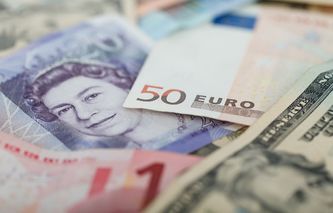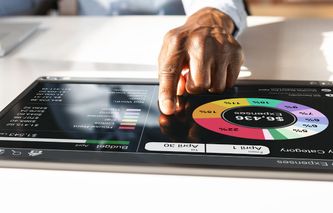Opening a bank account is like taking the first step towards financial freedom and security. It's an important milestone in adulthood, but the process can be confusing if you don't know what to expect. If you're still looking for the best bank account, we recommend you check our list of the best online bank accounts in the UK, but if you already know what you want, whether it's a current or savings account, the following guide will help you get up and running quickly and securely.
Step 1: Choose the Right Type of Bank Account
The first step in opening a bank account is deciding which type best fits your needs. The four most common types of bank accounts are:
Current accounts
Savings accounts
Packaged accounts
Joint accounts
Current Accounts
Current accounts offer more flexibility than savings accounts since you can easily transfer money between them. They also come with convenient features such as debit cards, online banking, and bill pay services that make managing your finances easier.
However, they typically have lower interest rates than savings accounts and may come with monthly fees or other charges. These are recommended for those who like to make regular transactions.
Savings Accounts
Savings accounts typically provide higher interest rates than checking accounts and are ideal for those who want to save money for the long term.
Interest earned on these accounts can help you build wealth over time, though they often come with fees or minimum deposit requirements. The idea is to save money for major purchases or emergencies, so you won’t need frequent access.
Packaged Accounts
A packaged account is a bank account that comes with additional services such as insurance, travel benefits, and rewards. It usually comes at an additional cost, but customers get access to discounts and perks for having the extra services included.
The main advantage here is that customers get access to discounts and rewards that may not be available with a standard bank account. This can include things such as travel insurance, mobile phone insurance, discounts on retail purchases, and more. Customers also often get access to preferential interest rates or higher overdraft limits if they opt for the package.
Joint Accounts
A joint bank account is a shared account that two or more people can access and use to manage their finances. Couples, family members, business partners, or anyone who wants to share control of their money usually opt for joint accounts. By opening a joint bank account, all parties have equal access to the funds in the account and any payments made from it will be shared.
The main advantage of a joint account is that it allows money to be easily shared between two or more people. This can be useful for households with shared expenses and bills, as well as businesses where partners need to pool funds.
How to Select the Right Bank Account For Your Needs
Before deciding whether to use a current, savings, joint, or packaged account, consider the following factors:
Fees – Look out for fees such as monthly service charges and minimum balance requirements.
Interest Rates – Higher interest rates mean more money in your pocket. Compare accounts to find the one with the highest rate of return.
Accessibility – Check if you can access your funds online or through an app, make deposits at ATMs and branches or write cheques.
Security – Make sure your bank is regulated by the FCA and is FSCS-insured to protect against loss of principal in case it fails.
Once you've weighed these factors and chosen an appropriate bank account for yourself, it's time to start the process of opening it.
Step 2: Gather the Necessary Information
Just like other forms of application, you're required to provide some documents and personal information when applying to open a bank account. Below are the documents and information commonly needed to open a bank account.
Valid Government-Issued Photo Identification – This could be your driver’s license, passport, or other forms of government-issued photo ID.
Proof of Address – Utility bills, council tax bill, rental agreements, and tax documents are some examples that can help verify your residential address.
Employment Information – Some banks require proof of employment when opening a new account. You can submit payslips or letters from employers.
Source of Funds – To comply with anti-money laundering regulations, you may need to provide details about the source of the funds you're depositing into the account.
Note: The documents you require will vary depending on the bank and the type of account you’re opening. For example, students may require a proof of enrollment letter from the school to waive any fees associated with student accounts. If you're below 18, you may need to provide parental consent to open an account.
Step 3: Apply for the Bank Account
Once you've gathered all the necessary documents, you can begin the application process. Depending on the bank, this can be done online or in person at a branch location.
For online applications, some banks have simplified the process by allowing customers to simply supply their basic information and upload scanned copies of their documents. After submitting your application, it usually takes one to five business days for the bank to review and approve it.
Minors are usually required to physically visit a bank branch to open an account, as parental consent is needed.
At the branch, you'll be asked to present your documents and fill out a hard copy form. The bank representative will then assist you in completing the application process and answer any questions or concerns you may have.
Step 4: Fund Your Bank Account
Once you receive confirmation that your application has been approved, the bank will send you a welcome kit containing your account number and other important information. You'll need to activate your account using the provided information before being able to use the services associated with it.
Typically, this can be done online or through an app. After activation, you should be able to access your account online, via mobile banking apps or make transactions at ATMs or branches.
Ways to Fund Your Bank Account
Once activated, you can open your account and begin depositing money into it. There are several methods to fund your bank account.
Direct Deposit
A direct deposit is an electronic transfer of funds from one bank account to another. It's a popular way to fund your account as it doesn't require you to physically visit the bank or make any withdrawals. All you need is your bank account number and sort code, which you can find in your welcome kit.
Online Transfers
You can also use online transfers such as wire transfers or ACH transfers to add money to your account. Transferring funds this way is quick and secure but often comes with transaction fees depending on the type of transfer chosen.
Cash Deposits
This option involves visiting the nearest branch and making cash deposits directly into your account using ATMs or with the help of bank staff at a counter. Depending on the bank, you may have to fill out a deposit slip or use an envelope available at the bank to make the deposit.
Cashier's Cheque
Also known as a banker’s draft, this method requires visiting your local bank and asking for a cashier’s check addressed to yourself in exchange for cash or another form of payment.
You can then take it to the relevant desk at the other bank and deposit it into your account using a teller. This is often used when transferring large sums of money as it's considered secure and reliable.
Step 5: Manage Your Account
Once you have your account set up and funded, it's time to start managing it. Here are some tips to help you get the most out of your bank account.
1. Set Up Online Banking
The best banks provide various tools and services to help customers manage their accounts more efficiently. Be sure to take advantage of online banking, budgeting apps, and other financial services to make managing your finances easier.
Online banking is a great way to stay on top of your finances from anywhere in the world. You can use it to view transactions, transfer money between accounts, pay bills, and more – all with just a few clicks. Keep an eye out for new features that could make managing your account even easier.
2. Utilise Automated Services
Banks provide various automated services such as text alerts, direct deposits, and automatic payments that can help make managing your funds easier and more efficient. Taking advantage of these features can help you stay organized and save time.
Setting up automatic payments for recurring bills such as mortgages and loans can help you avoid late fees and interest charges. You can also set up an autopay feature to transfer money from your checking to your savings account every month, helping you reach your financial goals sooner.
3. Monitor Your Balance Regularly
Checking your balance regularly is important to ensure that you don’t go over budget or overdraft your account. It's also a good idea to review transactions frequently, so you know where your money is going and can spot any suspicious activity quickly.
Monitoring your balance regularly also gives you a greater insight into where your money is going. By tracking your expenses, you can identify secret money suckers and protect your disposable income more effectively.
Also, consider setting long-term and short-term financial goals to stay motivated when it comes to managing your finances. Whether it’s saving for a house deposit or setting up a retirement fund, having these goals will help you stay on track.
The Bottom Line
While a rather straightforward process, setting up a bank account is an important step in taking control of your finances. Learning how to manage it properly can help you stay on top of your money and reach your financial goals.
FAQs
What is needed to open a bank account?
Can I open a bank account without going into the bank?
How much money do you need to open a bank account?
More Bank Account Advice
Make Informed Bank Decisions
.jpg)

.jpg)





.jpg)


